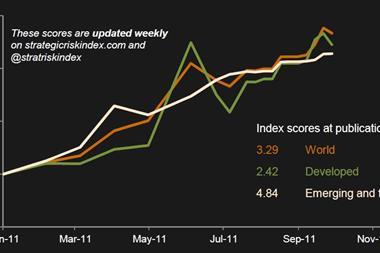Ferma is championing the views of European risk managers as the Commission prepares new corporate governance legislation. Nathan Skinner reports from Brussels.
Last week I travelled to Brussels for a press conference held jointly by the European Commission and Ferma (Federation of European Risk Management Associations).
As you’ll know Ferma acts as a powerful lobby representing the interests of European (including UK) risk managers, particularly under the leadership of the current energetic president, Peter Den Dekker.
Ferma organised the event to give some feedback to the Commission on its recommendations to improve European corporate governance frameworks, described in a recent Green Paper (available here). NOTE: A Green Paper is usually the first step before the Commission legislates.
The Commission’s attention was drawn to the area of corporate governance as a result of the spectacular banking failures at the height of the financial crisis.
Internal Market and Services Commissioner Michel Barnier ordered the review, saying: "In the current economic situation, we need more than ever to ensure that companies are well governed and consequently reliable and sustainable. Too much short term thinking has had disastrous consequences
“This Green Paper bears in mind all of the lessons drawn from the financial crisis” said Marc Hertgen, EU policy officer responsible for drafting the paper, who was on hand at the press conference to present the Commission’s thinking and respond to questions.
He explained that risk managers can expect recommendations in the following areas:
>> The financial crisis was linked to excessive risk taking and improper controls on risk strategies. Risk managers lacked the appropriate standing, credibility and authority in banks. The Commission would like to address this in other sectors as well.
>> In order for risk managers to be able to challenge their boards they need accurate and fast flowing information. This clearly wasn’t happening in many financial institutions. “Expect some recommendations here,” said Hertgen.
>> Clearly a number of financial institutions also lacked the right risk management culture. The Commission would like to promote appropriate and widespread risk cultures within organisations.
Many of these issues could be very positive for risk manager (although a European Directice won't make much different in markets were corporate governance is already well established, like the UK, France and Germany). Ferma welcomed most of the details outlined by the Commission. However, it does have some concerns.
Michel Dennery, Ferma board member and deputy chief risk officer of French energy giant GDF SUEZ, explained that one of the biggest objections surrounds the issue of disclosing strategic risks.
If a company is forced to disclose in its annual report strategic risks in the same was as it does with operational or health and safety risks then this is the same as disclosing a company’s strategy, warned Dennery.
“Disclosing too much strategic information is itself a competitive risk,” he said. “If we disclose our risk strategy we will give away information to our competitors.”
Ferma is also concerned that too much red tape could turn corporate governance and risk management into a "box-ticking" exercise.
It’s worth risk managers keeping an eye on these issues, particularly as the Commission is likely to legislate in the near future in an area that could significantly affect them.
It’s a comforting thought for the profession that Ferma is around to represent their views—risk managers who want a voice at a European level should think about engaging with it.



















